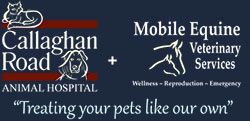Colic is one of the most common ailments in horses, and is the leading cause of death in horses. Although the term colic is often used as a diagnosis, its true definition is simply abdominal pain and is a symptom of an ailment, injury or disease. Colic includes all forms of gastrointestinal conditions which cause abdominal pain, even those that do not involve the gastrointestinal tract.
Signs that your horse is suffering from colic or abdominal pain include:
- Rolling
- Pawing
- Decreased Appetite
- Constipation
- Flank Watching
- Kicking or biting at abdomen
- Stretching Abdomen (posturing to urinate frequently)
- Restlessness
- Lying down and getting up frequently
- Sweating
- Increased respiration and/or flared nostrils
Causes of colic are most often gastrointestinal in nature. Distention or expansion of the intestines (gas colic), impaction or blockage for the intestinal tract, inflammation of the intestinal lining are most commonly seen. These can often be treated with minimal medical intervention. Some cases of gas colic can cause a displacement of the large intestine which is diagnosed with rectal palpation. Medical treatment will depend on your horse’s physical exam and history.
Severe and life threatening colic is caused by obstruction with restriction or blockage of blood supply. This happens when the large or small intestines twist (twisted gut), become strangulated or entrapped. The lack of blood causes necrosis or death of the affected organs. These cause of colic require surgical intervention immediately.
If your horse is suffering from colic they may only show some of the signs listed above. If you notice any of these signs call your horse’s veterinarian immediately. Not all forms of colic need medical intervention, but your vet can make recommendations based on your horse’s history and the severity of signs. Treating colic early can be critical in preventing a mild case from becoming an emergency and in the successful treatment of urgent cases.

